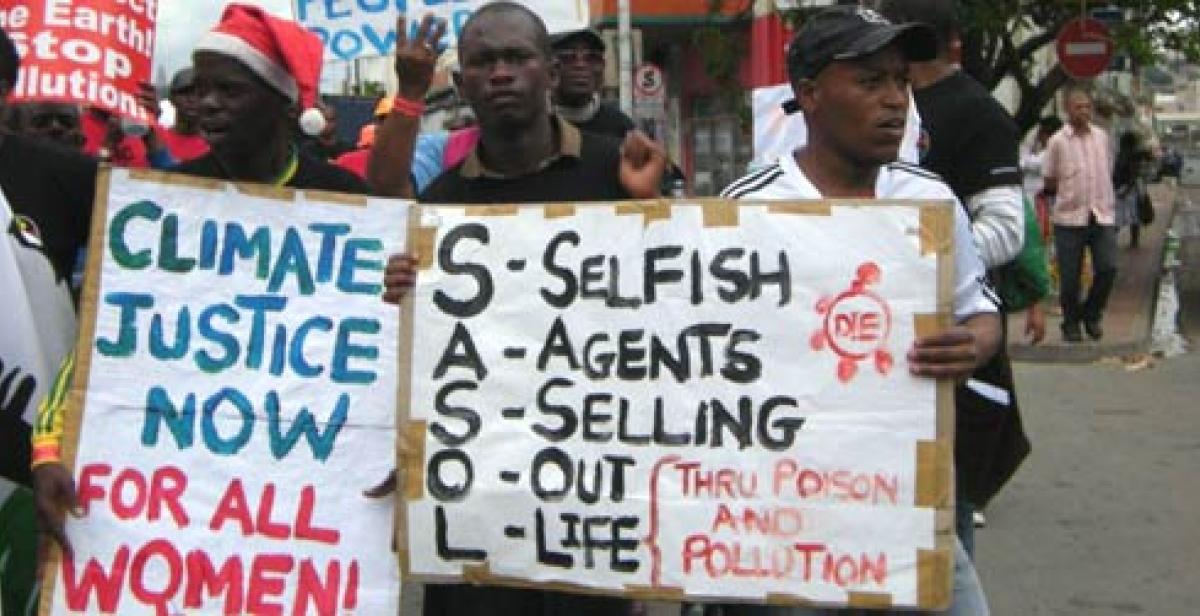Climate Justice supporters in Central America watched tentatively and with skepticism for news from the COP17 negotiations in Durban, fearing that COP17 would just lead us further down a dead-end road.
Due to lack of resources and little expectation of what might be achieved at the talks, very few people from the campaign in Central America made the trip to South Africa. But from afar everyone was watching and wondering how the nicknamed "climate circus" would unfold.
The heavy rainfalls caused by tropical depression 12E that pummeled Central America for 11 days in October have not been forgotten. The ongoing economic, infrastructural, and agricultural damage caused by the rains are fresh and clear reminders of what's to come if drastic measures aren't taken to mitigate greenhouse gas emissions.
It's not that the Climate Justice campaign seeks to be a wet blanket or only focus on the negative. It's just that it’s hard to see the kinds of changes that are necessary in order to face climate change being made within the UNFCCC framework.
Climate apartheid
There have been many references made to the history of South Africa and the symbolism of holding the COP there. Mandela and the anti-apartheid movement are an inspiration for many social justice movements across the world. For climate justice, the disappointing results from the COP17 ironically deepen the climate apartheid we see across the planet, where poor countries are condemned to continue facing the disproportionate impacts of climate change primarily caused by rich developed countries.
Angel Ibarra, President of Progressio partner UNES (the environmental movement of El Salvador), says: “Durban was a failure, and it’s the third time they have played casino, toying with the luck of the world.
“Durban has showed us a continued lack of rational agreements that could lead to implementation of actions that work to save humanity from climate disasters to come. They are condemning us to suffer disasters with many deaths, infrastructural and economic loss, and disappearances.
“It's been proved that even if they make promises, they are empty promises. They lied to us in 1992, and they did not comply with Kyoto.
“We are quite hopeless about the results of Durban.”
A climate justice perspective
Rosalía Soley works for the World Lutheran Federation, and is one of the few people from the Mesoamerica Climate Justice campaign who attended Durban. She told me: "The assessment of what happened in Durban depends on the perspective from which you analyse it. The majority see it as a failure and even a reversal, and few see advances.
"The document that emerged from Durban, in addition to not putting a time frame on emissions cut down, has changed from legally binding to becoming an instrument with legal force, which does not necessarily entail any obligation. So the question remains, is there a political will to address climate change?
"While an Adaptation Committee was created, which could be considered a breakthrough, its make up and function have not been determined, much less how it will be financed. There were no sources of long-term financing for the poorest countries determined, leaving even the Green Climate Fund without resources."
This is how the COP17 is being analysed through a climate justice lens.
‘Power for life’
I have been reading a lot of what Pablo Solon, former lead negotiator for Bolivia, has written about the COP, and found this passage inspiring:
"In the actions and events of the social movements in Durban, two battle cries emerged: ‘Amandla’ and ‘Jallalla’. The first one is a Xhosa and Zulu word from South Africa which means ‘power’. The second word is an expression in Aymara which means for life’. ‘Amandla! Jallalla!’ means ‘Power for life!’ This is the ‘power for life’ that we must build, that transcends borders, from our communities, neighbourhoods, workplaces and places of study, in order to stop this ongoing genocide and ecocide."
Climate Justice is not just about analysing the climate conferences and criticising the lack of progress. It's about an integrated proposal to recuperate our lands, societies, and ecosystems from the dead-end road the current economic model had set them on.
It's about building resilience at local levels coupled with an ongoing demand for justice and accountability on all levels, and creating models and visions for a world where there is room for all of the planet's habitants, and Mother Earth herself, to enjoy all that life has to offer.
Maggie von Vogt is a Progressio development worker in El Salvador.
Photo: protesters on the streets of Durban. (Photo © Rosalía Soley)




Comments
Sorry, Maggie, but when have
Sorry, Maggie, but when have extreme weather events been confused with climate change? I lived in Central America in the 70s and 80s and I well remember a couple of years of drought would be followed by a deluge. My grandmother, who is Nicaraguan, also used to talk about the feast and famine of Nicaraguan weather. We now live in the Sierra Madre in Mexico, and in February 2010 the temperature dropped to an unprecedented -27C for nearly a week.
Oh, I well accept global warming exists and we need to control our carbon footprints, but you give ammunition to the skeptics every time to claim an extreme weather event is evidence of global warming.
Thanks for your comment.
Thanks for your comment. You’re completely right that extreme weather events occurred long before climate change and they are not directly caused by carbon emissions. We ought to have made that more explicit in the blog. However, the predications are that extreme weather events will be more severe and more frequent in the future as a result of climate change.